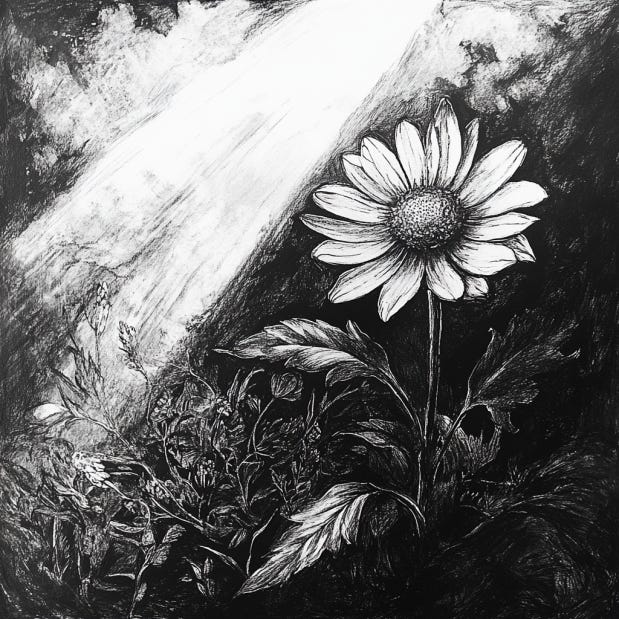I write for myself first, you lot second.
The reason creators write for themselves first is because people can smell lies. Stephen King put it best; everything you write must be the truth, everything else reeks of pretense, desperation and inauthenticity. Everything I write here must come from real experience and genuine belief, or you will know and the art will suck.
As is typical around this time of year, I’m preparing a kind of year-in-review piece for next week, to wrap my work up in a neat little bow and give you a satisfying sense of completion to 2024. Reflecting on some bullshit-free lessons/events I could extract and share, a single concept repeatedly bubbled to my surface that has catalyzed my year. I think it’s worth sharing in a standalone post this week instead. That idea is that the ordinary and mundane is underrated.
It’s easy to see why the opposite is celebrated.
The digital ecosystems that wrap around our lives are very, very good at showing us how amazing and appalling humans are. Should I ever wish to get dejected about my writing skills, the prospects of becoming famous, or even just feeling a little sexy I can, in a matter of seconds, be humbled by a river of beautiful, talented human beings on my feed. Extraordinary lives are broadcast by rabid media in no small part because they are simultaneously exhilarating and depressing. They pique within us fantasies of lives not yet lived, and exploit our hard-wired need for status. As as young man growing up with certain cultural morays about whata success means, I spent much of my late twenties quietly wondering why I hadn’t founded a software company or written a bestseller; reading about young men like Patrick Collison, or even the successes of my close friends would provoke strange anxieties that were hard to articulate.
This is problematic. Extraordinary lives, in actuality, are even more common than we realize. Your attention, after all, is so finite that you can’t begin to see all the incredible ways people have chosen to exist throughout history. Most of them will never be covered by any sort of media. In fact, you will probably never meet the people who would have most inspired you, lived the sort of life you wish you could, or overcame the exact quandary you’re currently battling. Almost every human life plays out on a small stage, with a few choice witnesses.
Of course, this highlights another problem with our fixation on the extraordinary; it’s impossible to fully capture the substance of said extraordinary lives. We easily confuse volume of coverage with a person’s overall importance. Step back even just a little, and we see how brittle our conception of an incredible life is. Elon Musk, by any standard, occupies rarefied air even by our lofty modern standards. Yet he has poor relationships with his own children, and a work ethic that seems to be driven by a force he has little control over. Considering that the quality of our overall lives is largely determined by our personal relationships, there’s almost nothing you could offer me to trade places with Elon.
You can only ever fully know one life from the inside - yours. So what ought we focus on?
Perhaps feeling some of the anxieties I outlined above, I read a book by an evangelical Christian called The Purpose Driven Life. A compelling idea from the Bible helps us put this pervasive, modern day complex into helpful perspective. Each of our tiny little existences is totally unique, a product of simple maths when you examine the number of combinations the human genome can create (and, if you’re a Christian, of God; mathematicians put that number at 4^6,000,000,000 permutations, a truly godlike figure). Your existence is a one-time, limited edition, never-to-be-repeated event. It is totally anomalous and infinitely glorious that you - you of all things - should be reading these words.
Because of your scarcity, it is completely rational to think of your existence as fulfilling a purpose that can only belong to you. Furthermore - and here it might be useful to think of a creator-like endowment - time spent wishing your life were different is borderline disrespectful. Here you are, occupying an impossibly unlikely, embodied mystery, and wishing it were somehow more so. If I were God, I’d wonder why you wanted more. I’d wonder why you bother wasting so much time fantasizing about the impossible and not doing what is available to you, right now, in this moment.
So, finally, we come to the point I will be dwelling more on in 2025. You will notice that your life, with all its wonderful, terrible details, is almost entirely spent in the mundane. You must wake up, you must work, you must drink fluids and you must shower, because these are the scaffolding from which you understand yourself - and there is nobility, even a mild heroicism in doing these things well, for no other reason than paying attention to your life as it actually unfolds shows you care about it. If all this seems esoteric, even the high language of philosophy tends to land back in the weeds of mundanity, and celebrate it.
Simone Weil will close this out, and usher me in to the new year with an urging to pay attention as you do your chores. “Attention is the rarest and purist form of generosity” she wrote. As any parent will tell you, there’s a reason a child prizes their attention above everything else; it shows they matter. The mundane, the ordinary, when we pay attention to it, proves we matter to ourselves as well.

















Share this post